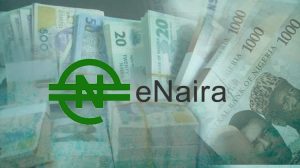- Rewane, FDC CEO: Economy to be largely positive
First Bank of Nigeria, the oldest banking institution in Africa’s largest economy and its most populous, is betting that recoveries in crude oil prices as well as maximisation of the country’s central bank digital currency, the e-Naira, could help keep the parallel currency market in check.

“However, recoveries in the oil sector and maximisation of the e-Naira could help keep the parallel market in check,” it stated.
The bank sounded a note of optimism for fiscal 2022, projecting a normalisation of the economy, and noting that, “with Nigeria’s economy projected to grow by 2.7 percent in 2022 as predicted by the International Monetary Fund (IMF), based on an expected recovery in crude oil prices and production, Nigeria will see economic activities normalising.”
Bismarck Rewane, managing director, Financial Derivative Company, the keynote speaker at the webinar, providing broad and specific views on the Nigerian economy, was bullishly optimistic about the general well being of the economy this year, describing it as ‘largely positive.’
Reviewing government activities in the economy, Rewane offered mixed views when he said the EGRP was not successful, but that the economic sustainability growth plan was a success in view of the fact that the Economic Sustainability Plan was a success given the rebound in GDP growth.
While staying positive, Rewane disclosed that the key drivers of growth this year would be sustained recovery of global oil prices, adding that gross domestic product (GDP) growth would remain fragile and that the key expected drivers of growth would be sustained recovery of global oil prices.
Providing key highlights of the key points to watch out for this year 2022, Rewane named them as follows:
- Politics of 2022 will be different from 2021 as a result of 2 elections (Ekiti & Osun)
- Oil price expected to average $70-85pb
- Oil production quota expected to rise further as OPEC+ continues to expand output
- Output will remain limited by sabotage: 1.4 – 1.6mbpd
- CBN likely to increase forex supply to manufacturers
- Pre-election spending to drive up cash in circulation and increase the money supply
Rewane, an economic analyst that is highly in demand in the country, hinged performance of the economy this year largely on a successful determination by the successful implementation of the 2022 budget and the newly approved 5-year development plan.
Rewane drew attention to some key policy expectations for fiscal 2022, namely,
Fuel subsidy removal
Implementation of cost-reflective tariffs
Key amendments to the Finance Act to support revenue mobilization (VAT, excise duty, digital tax)
Shift to a convergent floating exchange rate
Increased supply in the forex market by the CBN
According to him, the elimination of subsidies and the lower exchange rate will free up funds for all tiers of government.
- Fiscal deficits will decline and supplementary budgets are likely.
- Lower deficit financing requirements will put downward pressure on T/Bill rates.
- Inflationary pressures will intensify for 2-3 months before abating if it coincides with the increase in forex supply.
- Cost reflective tariffs to incentivize investment in the power sector.
- Reforms to boost investor confidence & trigger investment flows.
“We expect that the average oil price in 2022 will exceed the budgeted benchmark of $62 per barrel, offering some fiscal headroom.
“This would be powered by higher energy demand driven by the recovery of economic activities globally.
“This trajectory is expected to impact on our foreign reserves and strengthen the capacity of the Central Bank of Nigeria (CBN) to support the foreign exchange market,” Rewane further explained.
On the pandemic, Covid-19, the economist spoke of some hope for the impact of the pandemic, saying the threat of that scourge on businesses is gradually being moderated by the ongoing vaccination drive.
“The capacity of many countries to manage the pandemic has progressively improved with each pandemic experience. Therefore, the shocks of a subsequent variant of the pandemic on the global and domestic economies are likely to be less severe than previous ones,” he said.
Rewane warned, however, that policy reversal and delayed reforms could make the economic projections go wrong.
“If Nigeria falls into a debt crisis, leading to a credit rating downgrade, heightened social unrest spurred by high unemployment and poverty levels, oil prices below $50pb, leading to further deterioration of external imbalances,Rewane.
First Bank of Nigeria Limited (FirstBank) is the premier bank in West Africa and the leading financial inclusion services provider in Nigeria for over 127 years.
With over 750 business locations and over 130,620 banking agents spread across 99 percent of the 774 local government areas.
The bank has an international presence through its subsidiaries, FBNBank (UK) Limited in London and Paris, FBNBank in the Republic of Congo, Ghana, The Gambia, Guinea, Sierra Leone and Senegal, as well as a Representative Office in Beijing.
The bank has been handy at promoting digital payment in the country and has issued over 10 million cards, the first bank to achieve such a milestone in the country.
FirstBank’s cashless transaction drive extends to having more than 10million people on its USSD Quick Banking service through the nationally renowned *894# Banking code and over 4.5 million people on the FirstMobile platform.
Since its establishment in 1894, FirstBank has consistently built relationships with customers focusing on the fundamentals of good corporate governance, strong liquidity, optimised risk management and leadership.
Over the years, the bank has led the financing of private investment in infrastructure development in the Nigerian economy by playing key roles in the government’s privatisation and commercialisation schemes.
With its global reach, FirstBank provides prospective investors wishing to explore the vast business opportunities that are available in Nigeria, an internationally competitive world-class brand and a credible financial partner.







